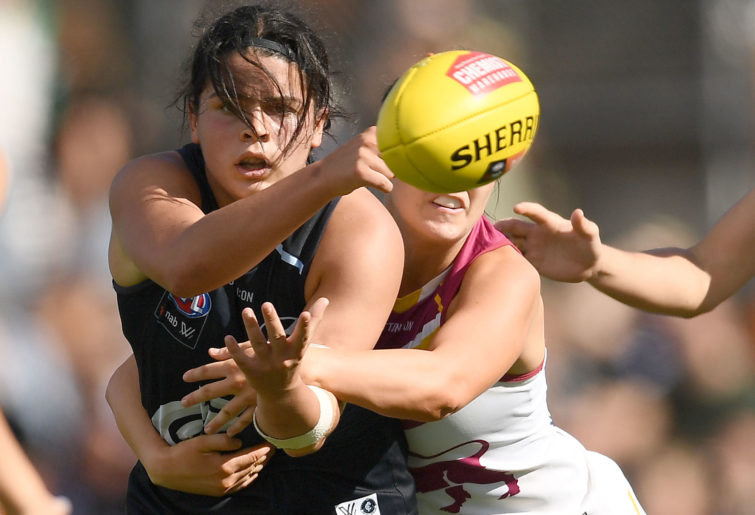The AFL is becoming more diverse thanks to the rise of players with multicultural backgrounds - but more should be done
Multicultural round was changed in 2018 showing that the AFL have not been as committed to multiculturalism as they should be.
Opinion
From Laura Ingraham of Fox News telling LeBron James to, “shut up and dribble,” Donald Trump demanding US women’s national soccer team co-captain Megan Rapinoe “win before she talks” to tennis star Naomi Osaka repeatedly recommended to, “keep politics out of sport,” it’s common for athletes to be told to keep quiet.
Carlton’s outspoken AFLW team is the latest target.
When the team lost to ladder leaders and two-time premiers, the Adelaide Crows in Round 5, fans came for them. “Focus on football,” “stay off social media,” and “it’s becoming a platform for everything other than playing football,” wrote members of one online fan forum.
One member even posed the question, “has the club worried too much about being PC to the detriment of on-field performance?”
The game was the club’s annual Carlton Respects match, a round that promotes gender equality for the prevention of violence against women. Let’s be abundantly clear, violence against women is a major issue in Australia.
Research suggests, “on average, at least one woman a week is killed by a partner or former partner in Australia,” while “eight in 10 women aged 18 to 24”, the core demographic of AFLW players, “were harassed on the street in the past year.”

Madison Prespakis of the Blues (Photo by Quinn Rooney/Getty Images)
Winning and having strong values, while ideal, aren’t mutually exclusive. Research from Our Watch, a not-for-profit initiative under the National Plan to Reduce Violence against Women and their Children 2010-2022, identified that sport has “the capacity to influence, inform and shape attitudes about important issues, such as gender equality.”
But for many outspoken fans, championing this vital cause was a distraction to the 80 minutes of time the player’s spent on the field at Ikon Park.
Meanwhile, the same day, some 9,000+ kilometres away in Beijing, China, the world watched the Winter Olympics. A celebration of sport underpinned by the Olympic Movement founding principles of non-discrimination, humanism, universality, solidarity, and alliance.
The World Olympians Association website proudly boasts, “the Olympic Movement is committed to promoting the spirit of Olympism – the point at which sport, culture and education converge,” a sentence that could very well have been lifted straight from Carton’s AFLW mission statement.
The Round 5 match was not an isolated community event and call to action from the club. In Round 4, celebrating inclusiveness and gender diversity, the team wore their pride jumper to acknowledging the LGBTQIA+ community, of which many of the Carlton and indeed AFLW players are part of.
Last season, the team wore their inaugural Indigenous jumper. While still maintaining the famous monogram and navy-blue colours, the jumpers surrounding imagery symbolised women, wisdom, knowledge and Indigenous culture.
The club’s social impact is a strategic and calculated move and something they don’t shy away from. Written in their strategic plan for all to see, the club boldly aspire to be the leaders of Australian sport, “by using the power of the Carlton brand to positively impact the community.”
There’s no disputing the football landscape has changed with the times. The introduction of the AFWL in 2017 proves that. And while we cry out for more personalities and less recycled cliches in the game, when the status quo is rocked, or heaven forbid, a team doesn’t win, out comes the condemnation.
Let’s not be distracted by the true problem at hand; that such injustices and inequalities exist in Australian society in 2022, not the fact that AFLW players are talking about them.
This dismissive separation of sport and politics rhetoric regularly comes from those in positions of power and privilege and the view that teams, and indeed athletes, are corporations and not human.
The AFLW is a league made up of humans. Of teachers, nurses, trades workers, students, and, like it or not, game changers. These players have a platform, and are not afraid to use it; win, lose or draw. The Footy Show, a program ironically taken off the air after a slew of racism and sexism controversies said it best, it’s more than a game.